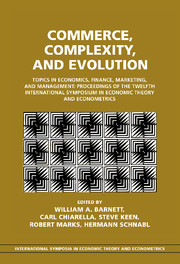 Commerce, Complexity, and Evolution
Commerce, Complexity, and Evolution Book contents
- Frontmatter
- Contents
- Series editor's preface
- Volume editors' preface
- Editors
- List of contributors
- I Philosophical and methodological implications of complexity and evolution in economic systems
- II Finance and the macroeconomy
- III Market and sectoral dynamics
- 10 Evolutionary patterns of multisectoral growth dynamics
- 11 The detection of evolutionary change in nonlinear economic processes: a new statistical methodology
- 12 Ergodic chaos in a piecewise linear cobweb model
- 13 The cobweb model and a modified genetic algorithm
- 14 The convergence of genetic learning algorithms, with particular reference to recent cobweb models
- IV Marketing and interdependent behavior
11 - The detection of evolutionary change in nonlinear economic processes: a new statistical methodology
Published online by Cambridge University Press: 05 December 2011
- Frontmatter
- Contents
- Series editor's preface
- Volume editors' preface
- Editors
- List of contributors
- I Philosophical and methodological implications of complexity and evolution in economic systems
- II Finance and the macroeconomy
- III Market and sectoral dynamics
- 10 Evolutionary patterns of multisectoral growth dynamics
- 11 The detection of evolutionary change in nonlinear economic processes: a new statistical methodology
- 12 Ergodic chaos in a piecewise linear cobweb model
- 13 The cobweb model and a modified genetic algorithm
- 14 The convergence of genetic learning algorithms, with particular reference to recent cobweb models
- IV Marketing and interdependent behavior
Summary
Over the past decade, there has been a dramatic increase in interest in evolutionary approaches to economic analysis. New journals, such as the Journal of Evolutionary Economics, have appeared, and new research networks, such as the European Association for Evolutionary Political Economy, have recorded rapidly growing memberships. A large literature now exists concerning evolutionary change in economic processes (Hodgson 1993, Andersen 1994, and Nelson 1995). From an economic-modeling perspective, evolutionary economic processes can be defined in terms of three fundamental, but interconnected, characteristics that they possess: First, they are, in some degree, time irreversible; second, as a consequence, adaptation must involve structural change; and third, such change must involve true uncertainty. Despite the rise in interest in evolutionary change in economics, there have been comparatively few contributions that consider the impact of this new perspective on econometric modeling by use of time-series data. Furthermore, even fewer contributors have considered ways in which such data could be used both to identify and to understand evolutionary processes.
There is little doubt that widespread acceptance of the evolutionary perspective in the broader community of economists will depend, to a significant extent, on the success that evolutionary economists have in offering a coherent approach to econometric modeling. In the largely nonexperimental science of economics, the bulk of the information at our disposal is in the form of time-series data. These data offer a rich source of quantitative economic history. However, at present, econometric modeling is dominated by cointegration testing and error-correction models (ECMs) that are designed to search for nonevolutionary explanations of why time series are related to each other.
Information
- Type
- Chapter
- Information
- Commerce, Complexity, and EvolutionTopics in Economics, Finance, Marketing, and Management: Proceedings of the Twelfth International Symposium in Economic Theory and Econometrics, pp. 233 - 252Publisher: Cambridge University PressPrint publication year: 2000